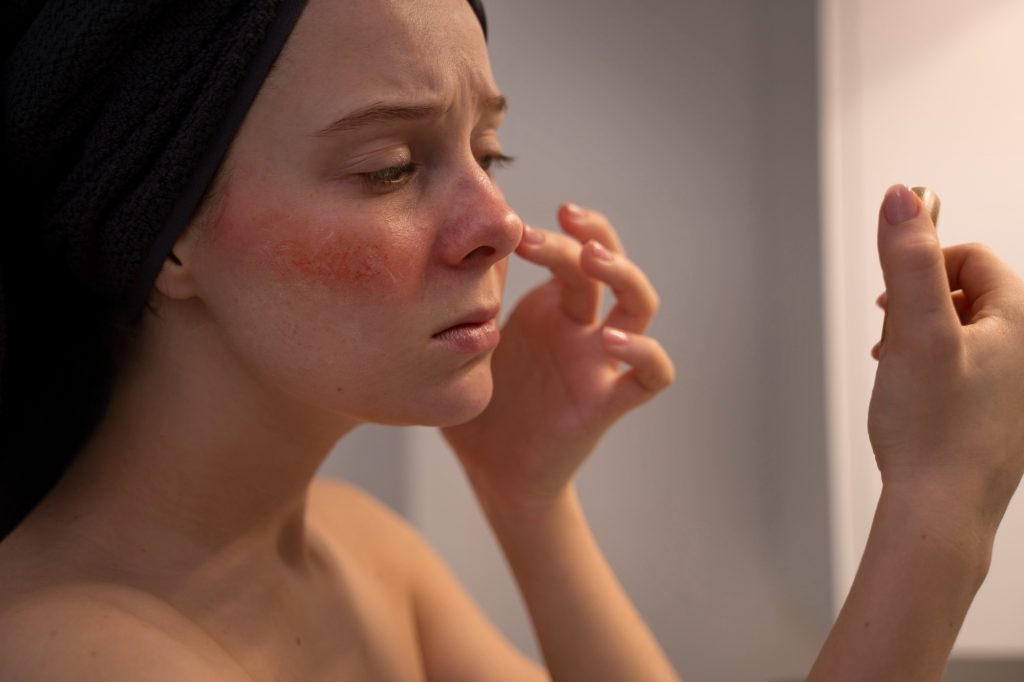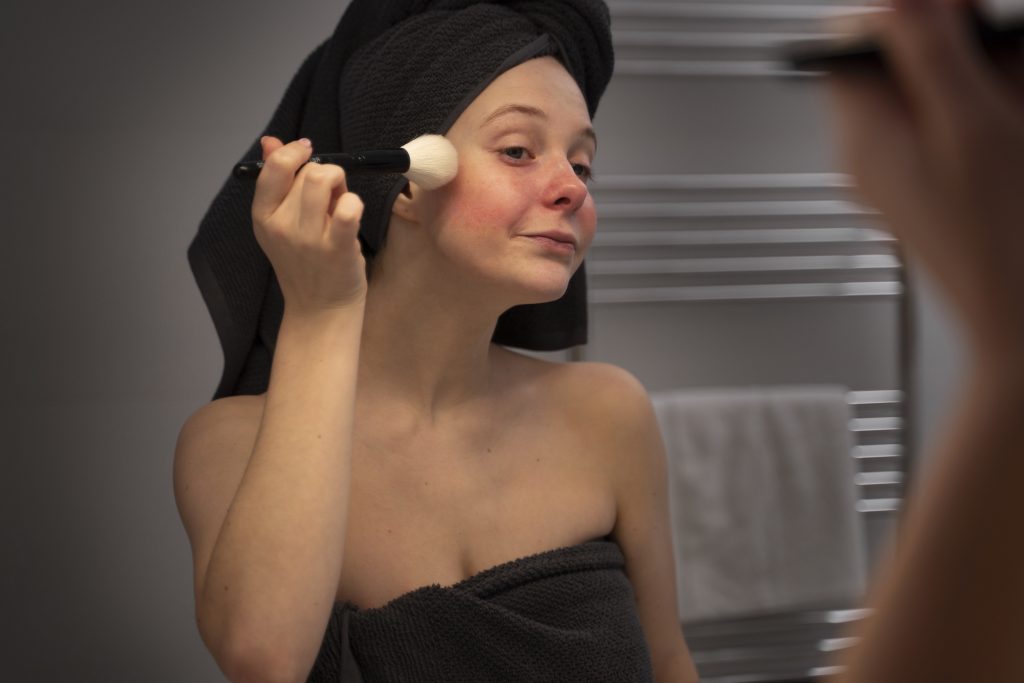Discover the key indicators to determine if your skin is truly sensitive.
How to Determine If Your Skin Is Truly Sensitive

Is your skin as sensitive as your feelings when someone eats the last slice of pizza? Are you constantly battling redness, itching, and irritation? If so, you might have sensitive skin. But how can you be sure? Let’s dive deep into the world of skin sensitivity and uncover the truth behind those pesky reactions.
Understanding Skin Sensitivity
Before we dive into the nitty-gritty details, let’s get familiar with the concept of skin sensitivity. What exactly does it mean? Well, my friend, it refers to how easily your skin gets its knickers in a twist when faced with certain triggers. It’s like having a bodyguard who’s a little too quick to start a fight.
Now, let’s debunk a few misconceptions that tend to float around like unicorns in a fairy tale.
What is Skin Sensitivity?
Skin sensitivity is when your skin becomes the star of a melodrama production and reacts strongly to external factors. These factors can range from the chemicals in your skincare products to the weather outside. It’s like playing Russian roulette, but instead of bullets, the gun is loaded with potential irritants. Fun, right?
But what exactly happens when your skin throws a tantrum? Well, picture this: your skin cells are like little soldiers, protecting your body from the outside world. They have a tough job, and sometimes they get a little overzealous. When triggered, these soldiers release a cascade of chemicals, causing redness, itching, and sometimes even swelling. It’s like a battle scene unfolding on your face.
Now, you might be wondering, “Why does this happen to me?” Well, my friend, there are several factors at play. First, genetics play a significant role. If your parents had sensitive skin, chances are you inherited it too. Second, environmental factors such as pollution, harsh weather conditions, and UV radiation can also contribute to skin sensitivity. Lastly, certain lifestyle choices like using aggressive skincare products or excessive exfoliation can further exacerbate the sensitivity of your skin.
Common Misconceptions About Sensitive Skin
Now, let’s talk about a few misconceptions people have about sensitive skin. One of the biggest myths is that sensitive skin is just a fancy term for being a drama queen. But trust me, dear reader, your skin’s sensitivity is real. It’s not just looking for attention; it genuinely feels overwhelmed by certain stimuli.
Imagine your skin as a delicate flower, easily wilted by the slightest touch. It’s not being dramatic; it’s just wired differently. Just like some people have heightened senses, your skin is hyper-aware of its surroundings and reacts accordingly. So, next time someone dismisses your sensitive skin as mere drama, educate them about the intricacies of skin sensitivity.
Another misconception is that sensitive skin is as common as a Kardashian selfie. But the truth is, not everyone has sensitive skin. Some are blessed with skin made of steel, while others are as delicate as a butterfly’s wings. It’s like a genetic lottery, and unfortunately, not everyone wins.
So, if you’re one of the lucky few with skin that can withstand anything, count your blessings. But for those of us with sensitive skin, we have to navigate a world full of potential triggers. It’s like walking on eggshells, constantly trying to avoid anything that might set off a skin reaction.
But fear not, my friend! Understanding your skin’s sensitivity is the first step towards finding the right products and routines to keep it happy and healthy. So, embrace your delicate skin, protect it like a precious gem, and remember, sensitivity is not a weakness, but a unique characteristic that sets you apart.
Identifying Signs of Sensitive Skin
Now that we’ve set the record straight about what sensitive skin really is, it’s time to put those detective skills to good use and identify if you belong to the sensitive skin squad. Let’s look closely at the signs that might indicate your skin is as sensitive as an artist with a broken pencil.
Physical Symptoms of Sensitive Skin
When it comes to sensitive skin, it loves to make its presence known. It’s not about being shy and hiding in the shadows. Oh no! It demands attention. So, if you experience redness, itching, stinging, or burning sensations on a regular basis, chances are your skin is sensitive. It’s like it has a built-in flare-gun, signaling its discomfort to the world.
But wait, there’s more! Sensitive skin doesn’t stop at just those physical symptoms. It’s a whole package deal. Not only does it react to irritants, but it also tends to be extra dry and prone to rashes. It’s like a rebellious teenager that refuses to follow the crowd and insists on doing its own thing. Gotta respect that independence, right?
Imagine your skin as a delicate flower, easily swayed by the slightest breeze. Sensitive skin is like that delicate flower, reacting to even the gentlest touch. It’s like having a personal alarm system that goes off whenever something isn’t quite right. Your skin is just trying to protect itself, like a knight in shining armor defending its castle.
Reactions to Common Skin Products
We live in a world filled with skincare products that promise to work miracles. But for those with sensitive skin, these products can be as dangerous as a bull in a china shop. If your skin throws a temper tantrum every time you introduce a new product, it’s a sign that you might belong to the sensitive skin clan. Trust me, it’s not your fault. Your skin just has high standards and refuses to tolerate anything less than perfect.
Picture your skin as a discerning critic, carefully examining each ingredient and formulation. It’s like having a personal sommelier for your skincare routine. Your skin knows what it likes and what it doesn’t, and it’s not afraid to let you know. It’s like having a built-in quality control system, ensuring that only the best of the best touches your precious face.
But fear not, sensitive-skinned friend! While it may seem like a challenge to navigate the world of skincare, there are products out there specifically designed for your unique needs. It’s like finding a needle in a haystack, but once you discover the perfect match, it’s like fireworks on the Fourth of July. Your skin will thank you for taking the time to understand its sensitive nature.
The Role of Genetics in Skin Sensitivity
Now, let’s dip our toes into the mysteries of genetics and explore how they influence our skin’s sensitivity. It’s like playing a game of DNA hide-and-seek.
Inherited Skin Conditions
Genetics has a way of passing down more than just eye color and height. It also likes to throw a few curveballs in the form of inherited skin conditions, like eczema or rosacea. So, if your ancestors left you more than family heirlooms, such as a tendency for redness or dryness, your skin might carry the sensitivity torch as well.
But fear not, my friend. Every superhero has an achilles heel, and every sensitive-skinned individual has a power they can leverage. In this case, it’s knowledge. Armed with the understanding of your genetic makeup, you can adjust your skincare routine to better cater to your skin’s unique needs.
Ethnicity and Skin Sensitivity
Just like a diverse group of friends, different ethnicities come with their own unique traits. And yes, that includes their skin sensitivity. Studies have shown that certain ethnicities tend to have a higher predisposition to sensitive skin. So, if you find yourself boasting a beautiful mix of heritage, it’s worth considering that your skin might have inherited some sensitivity along the way.
Environmental Factors Affecting Skin Sensitivity
Now that we’ve covered the genetic side of things, it’s time to explore how the environment can have its say on your skin’s sensitivity. Prepare yourself, my friend, for a journey through climate and pollution.
Climate and Skin Sensitivity
Your skin, just like your Netflix choices, can be heavily influenced by the weather. Extreme temperatures, whether it’s scorching hot or freezing cold, can trigger a reaction in sensitive skin. It’s like mother nature is playing a game of “guess which season will make your skin freak out?”
Humidity, or lack thereof, can also be a factor. Dry air tends to suck out moisture from your skin faster than a vacuum cleaner on steroids. So, it’s no surprise that sensitive skin might feel like it’s taking a desert vacation when the humidity hits rock bottom.
Pollution and Skin Sensitivity
Living in a bustling city can be both exciting and detrimental to your skin’s well-being. Pollution, like that annoying distant relative who always overstays their welcome, can wreak havoc on sensitive skin. The harmful particles in the air can penetrate your skin’s defenses, causing inflammation, irritation, and dullness. It’s like a stampede of not-so-friendly unicorns charging towards your skin.
But fret not, dear reader, for there are steps you can take to protect your delicate skin and keep those pesky pollutants at bay. Consider investing in skincare products with protective properties and make cleansing a top priority in your skincare routine. Say goodbye to unicorn stampedes!
Testing for Skin Sensitivity
All right, detective. You’ve made it this far in your quest to determine if your skin is truly sensitive. Now, let’s talk about the methods used to unleash your skin’s inner drama queen and see how it reacts to various stimuli.

Patch Testing for Skin Reactions
Imagine your skin as a contestant on a reality show called “Spot the Irritant.” The patch test, my friend, is when your skin gets to participate in this exciting game. By applying small amounts of different substances to specific areas of your skin, you can observe if any reactions occur. It’s like conducting a science experiment, but instead of a bubbling flask, you have colorful patches on your arm.
The patch test allows you to identify which ingredients your skin might be sensitive to, like your personal skincare Sherlock Holmes. Armed with this knowledge, you can navigate the skincare aisle with confidence, knowing which products to avoid like the plague.
Professional Dermatological Assessments
If you’re a skin enthusiast, you might want to take your investigation a step further and seek professional help. A dermatologist can conduct various tests and assessments to evaluate your skin’s sensitivity and provide tailor-made advice. It’s like having a personal skincare guru guiding you towards skin harmony.
So, if you’re ready to ditch the guessing game and uncover the truth about your skin’s sensitivity, paying a visit to a dermatologist might just be the missing puzzle piece in your skincare journey.
In Conclusion
There you have it, my friend. Determining if your skin is truly sensitive is like solving a mystery. By understanding the concept of skin sensitivity, identifying the signs, exploring genetic and environmental factors, and conducting tests, you can unlock the secrets hidden within your skin.
Remember, sensitivity is not a negative trait. It’s a unique characteristic that sets your skin apart, like a fingerprint or a snowflake. Embrace it, protect it, and give it the care it deserves. Because sensitive skin is worth celebrating, not hiding.





